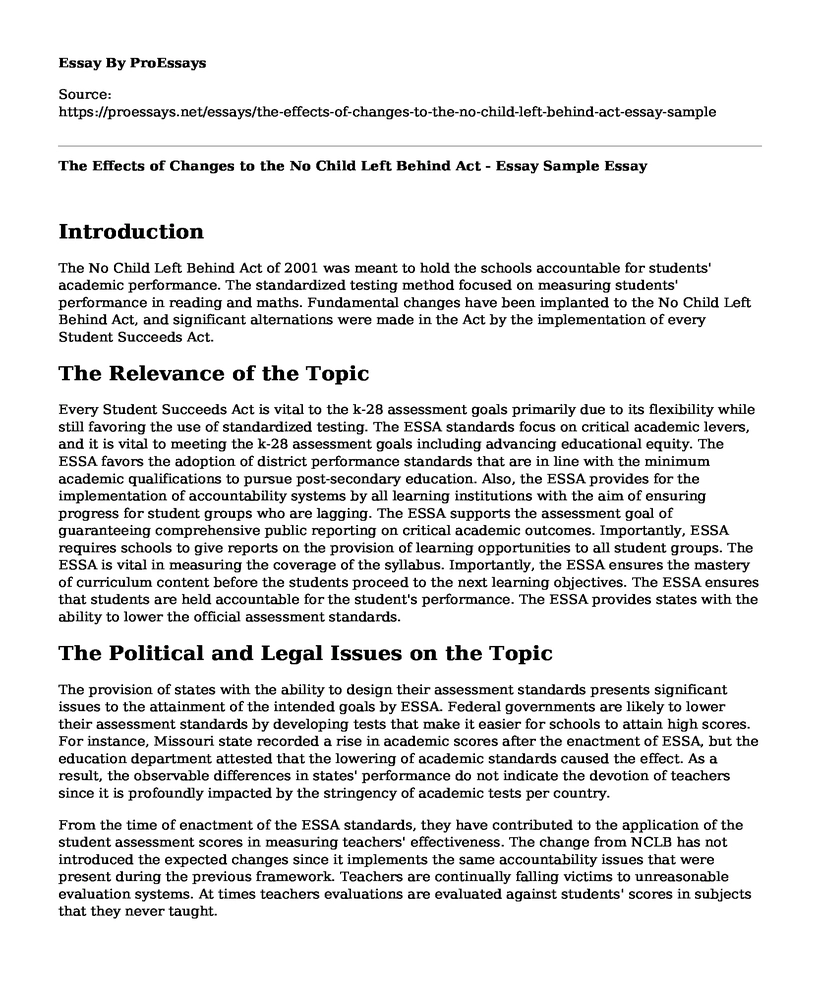Introduction
The No Child Left Behind Act of 2001 was meant to hold the schools accountable for students' academic performance. The standardized testing method focused on measuring students' performance in reading and maths. Fundamental changes have been implanted to the No Child Left Behind Act, and significant alternations were made in the Act by the implementation of every Student Succeeds Act.
The Relevance of the Topic
Every Student Succeeds Act is vital to the k-28 assessment goals primarily due to its flexibility while still favoring the use of standardized testing. The ESSA standards focus on critical academic levers, and it is vital to meeting the k-28 assessment goals including advancing educational equity. The ESSA favors the adoption of district performance standards that are in line with the minimum academic qualifications to pursue post-secondary education. Also, the ESSA provides for the implementation of accountability systems by all learning institutions with the aim of ensuring progress for student groups who are lagging. The ESSA supports the assessment goal of guaranteeing comprehensive public reporting on critical academic outcomes. Importantly, ESSA requires schools to give reports on the provision of learning opportunities to all student groups. The ESSA is vital in measuring the coverage of the syllabus. Importantly, the ESSA ensures the mastery of curriculum content before the students proceed to the next learning objectives. The ESSA ensures that students are held accountable for the student's performance. The ESSA provides states with the ability to lower the official assessment standards.
The Political and Legal Issues on the Topic
The provision of states with the ability to design their assessment standards presents significant issues to the attainment of the intended goals by ESSA. Federal governments are likely to lower their assessment standards by developing tests that make it easier for schools to attain high scores. For instance, Missouri state recorded a rise in academic scores after the enactment of ESSA, but the education department attested that the lowering of academic standards caused the effect. As a result, the observable differences in states' performance do not indicate the devotion of teachers since it is profoundly impacted by the stringency of academic tests per country.
From the time of enactment of the ESSA standards, they have contributed to the application of the student assessment scores in measuring teachers' effectiveness. The change from NCLB has not introduced the expected changes since it implements the same accountability issues that were present during the previous framework. Teachers are continually falling victims to unreasonable evaluation systems. At times teachers evaluations are evaluated against students' scores in subjects that they never taught.
The ESSA provides for the interference of government authorities in schools' management. Under the ESSA, the state has a responsibility to intervene in schools' evidence-based programs where student scores fall lower than five percent. Also, the state government has a responsibility to conduct an inquiry in schools that record a high academic gap and in educational institutions that document lesser than two-thirds of the students proceed to graduation at their stipulated time.
Students Needs
Students are required to have profound mastery of the course contents. Teachers have a responsibility to ensure that students score higher than eighty percent of the classroom assessment scores before the teachers move to the next objective. Students need to master the essential courses to guarantee them the ability to pursue post-secondary education. There is a need for students to have profound knowledge in maths and sciences
The students with special needs require different facilities compared with other children and some of the children living with disabilities need to learn from problem-based learning centers. Importantly, the application of ESSA in problem-based centers favors the use of traditional teaching methods focusing on problem-solving skills, logical reasoning, peer-tutor relationships, and interpersonal relationships.
Cite this page
The Effects of Changes to the No Child Left Behind Act - Essay Sample. (2022, Mar 14). Retrieved from https://proessays.net/essays/the-effects-of-changes-to-the-no-child-left-behind-act-essay-sample
If you are the original author of this essay and no longer wish to have it published on the ProEssays website, please click below to request its removal:
- Essay on Lessons from Preschool Observation
- Emotion Regulation Abilities in Young Children Paper Example
- Essay Example on Honors vs Regular Students: Engagement & Self-Handicapping.
- Unlock Life's Opportunities With a College Education - Essay Sample
- Paper Example on Tech in Schools - Enhancing Education in Dubai
- Essay Example on School Uniform Debate: Pros and Cons
- Paper Sample on COVID-19 Pandemic: Designing Effective Online Learning Platforms







